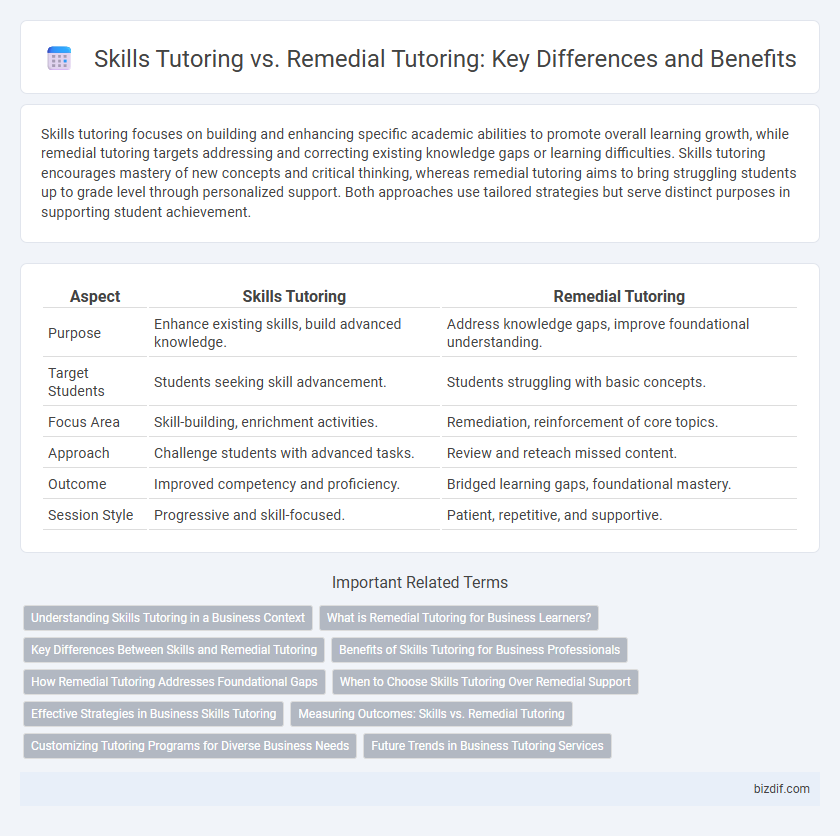Skills tutoring focuses on building and enhancing specific academic abilities to promote overall learning growth, while remedial tutoring targets addressing and correcting existing knowledge gaps or learning difficulties. Skills tutoring encourages mastery of new concepts and critical thinking, whereas remedial tutoring aims to bring struggling students up to grade level through personalized support. Both approaches use tailored strategies but serve distinct purposes in supporting student achievement.
Table of Comparison
| Aspect | Skills Tutoring | Remedial Tutoring |
|---|---|---|
| Purpose | Enhance existing skills, build advanced knowledge. | Address knowledge gaps, improve foundational understanding. |
| Target Students | Students seeking skill advancement. | Students struggling with basic concepts. |
| Focus Area | Skill-building, enrichment activities. | Remediation, reinforcement of core topics. |
| Approach | Challenge students with advanced tasks. | Review and reteach missed content. |
| Outcome | Improved competency and proficiency. | Bridged learning gaps, foundational mastery. |
| Session Style | Progressive and skill-focused. | Patient, repetitive, and supportive. |
Understanding Skills Tutoring in a Business Context
Skills Tutoring in a business context focuses on developing specific competencies such as communication, problem-solving, and technical abilities to enhance employee performance and productivity. Unlike Remedial Tutoring, which aims to address and correct knowledge gaps, Skills Tutoring proactively builds expertise aligned with organizational goals. Effective Skills Tutoring programs lead to measurable improvements in professional skills, supporting career advancement and business growth.
What is Remedial Tutoring for Business Learners?
Remedial tutoring for business learners targets foundational skill gaps that hinder understanding of core concepts such as financial analysis, marketing strategies, and business communication. It focuses on reinforcing essential knowledge areas like basic math, reading comprehension, and critical thinking to ensure learners can confidently engage with advanced business topics. This approach helps learners build a solid base, enabling improved performance in coursework and professional applications.
Key Differences Between Skills and Remedial Tutoring
Skills tutoring targets the development of specific academic abilities, such as reading comprehension or algebraic problem-solving, aiming to enhance proficiency and mastery in targeted areas. Remedial tutoring focuses on addressing foundational gaps and learning deficits, often providing intervention to bring students up to grade-level standards and prevent further academic delays. While skills tutoring is proactive and enrichment-oriented, remedial tutoring is reactive, emphasizing correction and recovery of essential knowledge and competencies.
Benefits of Skills Tutoring for Business Professionals
Skills tutoring enhances business professionals' core competencies such as communication, time management, and problem-solving, leading to improved workplace performance and career growth. Tailored sessions focus on practical application, fostering confidence and efficiency in real-world business scenarios. This proactive approach prevents skill gaps, making professionals more adaptable to evolving industry demands and driving sustained success.
How Remedial Tutoring Addresses Foundational Gaps
Remedial tutoring targets foundational skill gaps by identifying and reinforcing core concepts students struggle with, ensuring a solid academic base. This approach differs from skills tutoring, which focuses on enhancing existing knowledge to boost proficiency and confidence. By addressing underlying deficiencies, remedial tutoring promotes long-term academic success and reduces learning barriers.
When to Choose Skills Tutoring Over Remedial Support
Skills tutoring is most effective when a student needs to build or enhance foundational abilities in a specific subject, such as math fluency or reading comprehension, before advancing to more complex topics. This approach targets skill acquisition and mastery, ideal for learners who struggle with current grade-level content but do not have significant learning gaps. Choose skills tutoring over remedial support when the goal is to strengthen essential competencies rather than reteach entire concepts from earlier grades.
Effective Strategies in Business Skills Tutoring
Skills tutoring in business focuses on developing specific competencies such as financial literacy, marketing strategies, and leadership techniques, using tailored methods like case studies, simulations, and real-world projects to enhance practical understanding. Remedial tutoring addresses fundamental gaps in knowledge, often revisiting basic concepts to build a stable foundation, whereas skills tutoring emphasizes advanced application and strategic thinking crucial for professional growth. Effective strategies in business skills tutoring include personalized learning plans, performance analytics, and continuous feedback loops to adapt to the learner's progress and industry demands.
Measuring Outcomes: Skills vs. Remedial Tutoring
Measuring outcomes in skills tutoring typically involves assessing the development of specific competencies, such as critical thinking, problem-solving, or subject-specific abilities, through standardized tests or performance-based evaluations. In remedial tutoring, outcome measurement focuses on closing learning gaps and improving foundational knowledge, often tracked by diagnostic assessments and progress monitoring tools that indicate mastery of basic skills. Both approaches require tailored metrics to effectively evaluate student growth and guide instructional strategies for improved academic success.
Customizing Tutoring Programs for Diverse Business Needs
Skills tutoring tailors instruction to enhance specific competencies aligned with business goals, fostering targeted employee development and measurable performance improvement. Remedial tutoring addresses fundamental knowledge gaps, ensuring foundational skills are solidified to support overall workforce competence. Customizing tutoring programs according to organizational needs promotes efficient learning pathways and maximizes training ROI.
Future Trends in Business Tutoring Services
Future trends in business tutoring services highlight a shift towards personalized skills tutoring that emphasizes advanced digital competencies, leadership development, and strategic problem-solving, which align closely with evolving industry demands. Remedial tutoring remains essential for foundational knowledge gaps but is increasingly integrated with technology-driven adaptive learning systems to enhance efficiency and outcomes. The rise of AI-powered platforms and data analytics in tutoring facilitates customized learning paths, predicting skill gaps, and delivering targeted business skills training that supports career advancement and organizational growth.
Skills Tutoring vs Remedial Tutoring Infographic

 bizdif.com
bizdif.com